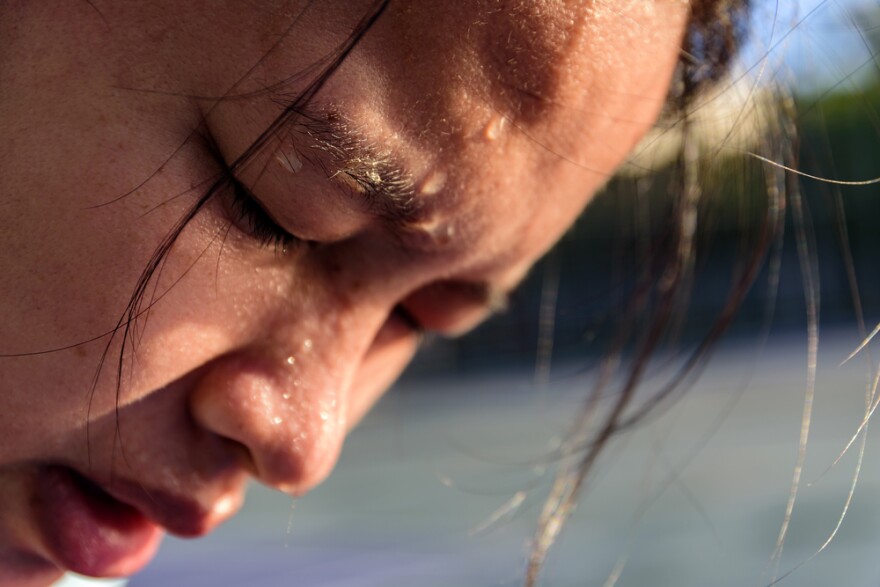Time spent outside in the heat is often uncomfortable, but as Texas marks more triple-digit days, it can be dangerous, leading to heatstroke and heat exhaustion if you're not careful.
Dr. Alexander Eastman is medical director of Parkland Hospital’s Trauma Center and an assistant professor of surgery at UT Southwestern Medical Center.
He explains the basics of heat-related illnesses and what Texans can do to stay safe.
The difference between heatstroke and heat exhaustion: Heatstroke and heat exhaustion are heat-related illnesses that occur along a spectrum. If you look at normal temperature and heatstroke as the two ends of that spectrum, heat exhaustion is kind of in the middle. It’s sort of a more mild form of heat illness or injury. Heatstroke can certainly be life-threatening, and once you get to the point where you have heatstroke, you are at risk of death or serious complications.
What causes heatstroke? It’s mostly related to high temperatures. Your body has great compensatory mechanisms to try and maintain it at our normal body temperature, but as you exert yourself, and as the ambient temperature rises, and the heat index rises, then at some point your body’s ability to maintain its normal temperature is uncoupled. When your body temperature rises, certain systems start to shut down, and that’s the definition of heatstroke. Most people at their normal activity level aren’t going to sustain heatstroke unless they’re exposed to the elements for a long time.
Signs of heatstroke or exhaustion: The signs are sometimes subtle, but the best thing is to listen to your body. If you feel like you’re thirsty, you’re already a little behind in the volume of fluid your body really needs. If you are thirsty, if you’re lightheaded, if you feel bad, you feel like ‘Hey, the heat’s starting to get to me,’ then it is. That’s the time where you need to sit down, get into a cool place, get some water into you and try to recover a little bit before you resume your activity.
Symptoms of heatstroke
- High body temperature: A body temperature of 104 degrees or higher is the main sign of heatstroke.
- Altered mental state or behavior: Confusion, agitation, slurred speech, irritability, delirium, seizures and coma can all result from heatstroke.
- Alteration in sweating: In heatstroke brought on by hot weather, your skin will feel hot and dry to the touch. However, in heatstroke brought on by strenuous exercise, your skin may feel moist.
- Nausea and vomiting: You may feel sick to your stomach or vomit.
- Flushed skin: Your skin may turn red as your body temperature increases.
- Rapid breathing: Your breathing may become rapid and shallow.
- Racing heart rate: Your pulse may significantly increase because heat stress places a tremendous burden on your heart to help cool your body.
- Headache: Your head may throb.
Causes
- Exposure to a hot environment: In a type of heatstroke, called nonexertional or classic heatstroke, being in a hot environment leads to a rise in body temperature. This type of heatstroke typically occurs after exposure to hot, humid weather, especially for prolonged periods, such as two or three days. It occurs most often in older adults and in people with chronic illness.
- Strenuous activity: Exertional heatstroke is caused by an increase in body temperature brought on by intense physical activity in hot weather. Anyone exercising or working in hot weather can get exertional heatstroke, but it's most likely to occur if you're not used to high temperatures.
- In either type of heatstroke, your condition can be brought on by:
- Wearing excess clothing that prevents sweat from evaporating easily and cooling your body.
- Drinking alcohol, which can affect your body's ability to regulate your temperature.
- Becoming dehydrated by not drinking enough water to replenish fluids lost through sweating.
Risk factors
- Age: Your ability to cope with extreme heat depends of the strength of your central nervous system. In the very young, the central nervous system is not fully developed, and in adults over 65, the central nervous system begins to deteriorate, which makes your body less able to cope with changes in body temperature. Both age groups usually have difficulty remaining hydrated, which also increases risk.
- Exertion in hot weather: Military training and participating in sports, such as football, in hot weather are among the situations that can lead to heatstroke.
- Sudden exposure to hot weather: You may be more susceptible to heat-related illness if you're exposed to a sudden increase in temperature, such as during an early-summer heat wave or travel to a hotter climate. Limit activity for at least several days to allow yourself to acclimate to the change. However, you may still have an increased risk of heatstroke until you've experienced several weeks of higher temperatures.
- A lack of air conditioning: Fans may make you feel better, but during sustained hot weather, air conditioning is the most effective way to cool down and lower humidity.
- Certain medications: Some medications affect your body's ability to stay hydrated and respond to heat. Be especially careful in hot weather if you take medications that narrow your blood vessels (vasoconstrictors), regulate your blood pressure by blocking adrenaline (beta blockers), rid your body of sodium and water (diuretics), or reduce psychiatric symptoms (antidepressants or antipsychotics). Stimulants for attention-deficit/hyperactivity disorder (ADHD) and illegal stimulants such as amphetamines and cocaine also make you more vulnerable to heatstroke.
- Certain health conditions: Certain chronic illnesses, such as heart or lung disease, might increase your risk of heatstroke; so can being obese, being sedentary and having a history of previous heatstroke.
This interview has been edited for brevity and clarity.







